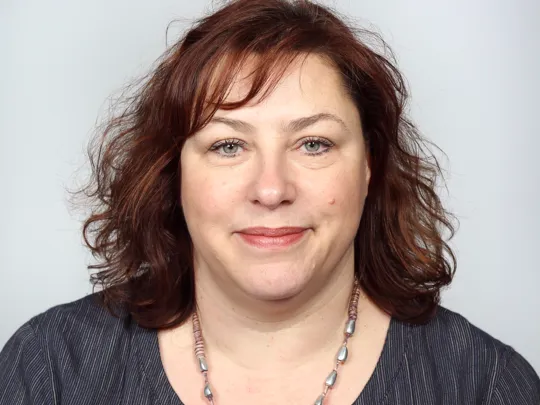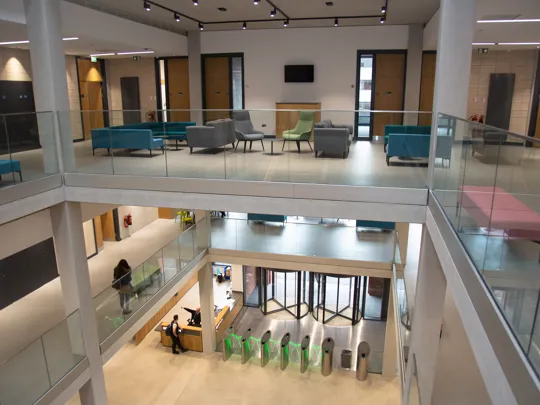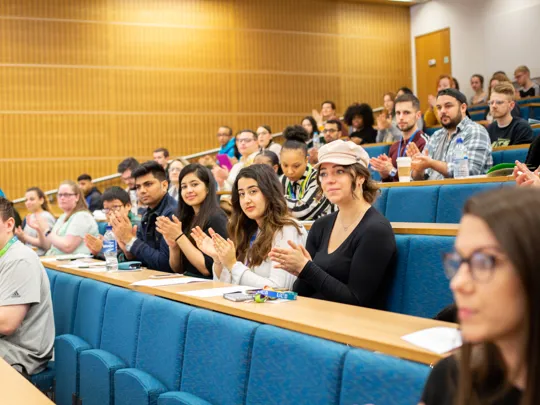of graduate employers say relevant experience is essential to getting a job with them
Why choose this degree course?
- WORK PLACEMENTS – Gain essential real-world work experience throughout your degree by going on placement one day per week, with opportunities in a huge variety of health and social care settings
- ENRICHMENT – Enhance your CV and professional development with further training and qualifications, including key areas for care workers such as mental health first aid, basic life support, infection prevention and control and autism awareness.
- SPECIALISE YOUR STUDIES – Pick a research topic to study in depth and choose from a wide range of optional modules, including themes such as substance misuse, mental wellbeing and criminology
- NO EXAMS - If you are not keen on exams, this course is for you. Unlike many degrees in this field, you will have no written exams during or at the end of the course and will be assessed through practical assessments and coursework only
- AWARD-WINNING UNIVERSITY – Study at the highest-ranking university in the region according to student choice (Whatuni Student Choice Awards 2023)
Our facilities
Students on our health and social care management courses have access to our wide variety of learning spaces at University College Birmingham, ensuring you have the right environments to build your knowledge, from lecture theatres to interactive group working spaces and extensive library resources.
Course breakdown
Students on the FdSc have the option of progressing onto the final year upon completion of the foundation degree.
- Year 1
- Year 2
- Year 3
Core modules
Foundations of Health and Social Care
This module provides you with underpinning knowledge of the role, structure, challenges and opportunities of the sector. Working understanding of complex needs, multi-agency working, service user involvement, assessment, risk management, care planning and review will all be developed.
Sociology of Health
This module introduces students to wide-raging sociological perspectives and contemporary debates relating to the sociology of health, well-being and professional practice. Through enquiry-based learning, students will explore the sociological imagination, the relationship between wider determinants, health and wellbeing, and social inequalities.
Communication for Health and Social Care Professionals
You will develop your skills in effectively building therapeutic relationships, helping and engaging with individuals, adapting to different abilities and preferences, working with individuals and groups, challenging situations, crisis intervention and maintaining boundaries. Teaching and assessment of this module is closely linked to 100 hours vocational placement.
Lifespan Psychology
This module explores Psychological theories across the lifespan and their ethical application within diverse contexts in Health and Social Care. It explores changes in development over the lifespan and introduces the main psychological theories explaining this process. It looks at a range of Psychological approaches and interventions and how they can be applied to positively support individuals within the health and social care field.
Safeguarding Children and Adults
This module aims to equip you with an in-depth understanding of safeguarding protocols for children, young people, and adults in health and social care environments. By exploring mandatory local and national safeguarding frameworks and guidelines, you will learn to identify signs of abuse, apply safeguarding procedures, and accurately document concerns. Additionally, you will study ethical principles and practices that prioritise the voice of the service user, which are fundamental to making informed decisions.
Academic Skills
Your vital skills and abilities will be developed to enable you to study effectively at an undergraduate level. Key learning concepts will be identified and related to skills relevant to the industry, which will then be developed through a variety of tasks and activities. This is done in a relevant context that takes into account the wider education and community focus of your course as a whole.
Core modules
Advocacy, Coproduction and Empowerment
You will develop an understanding of the historical background to advocacy, coproduction and empowerment. You will evaluate these principles and develop critical skills to apply these within health and social care settings. You will develop knowledge of a range of relevant policies and legislation, ethical principles and best practices relevant to advocacy, empowerment and coproduction.
Developing Research in Health and Social Care
You will develop your own research proposal with careful consideration and justification of proposed methods, analysis and discussion, relevant to a contemporary health and social care issue. You will develop a strong justification for the proposed research and careful consideration of research methods, ethics and appropriate analyses. Students will be able to extend their introductory research skills at Level 4.
Promoting Health and Wellbeing
Notions of health, how need is assessed or underpinned, the concepts and techniques of health promotion and education are all explored. Practical skills will be developed in how to encourage positive behaviour change using evident and integrated approaches, addressing structural and personal barriers to change.
The Health and Social Care Professional
Enhancing the foundations for your health and social care career, emotional intelligence in the work place, reflective and critical practice, professionalism, managing yourself and others, utilising supervision and debriefs, team work and inclusion are all explored. Teaching and assessment of this module is closely linked to 200 hours vocational placement.
Coaching and Mentoring
This module will develop your understanding and skills to enable you to provide effective coaching and mentoring work, either as part of a specific role or within your general health and social care practice. The aims, roles, techniques and challenges of this type of work will all be explored.
Choose 1 optional module
Managing Acute and Chronic Conditions
This module builds on the students understanding of lifespan development, and psychological and sociological influences on health and sickness. It focuses on understanding the pathophysiology of conditions, and the holistic impact this has on the individual, their family, and services. It explores the health and social care needs and how management of conditions may change over time from the perspective of the client, their family, and service providers. It will also introduce students to key theories and concepts, in order to structure and form well-reasoned strategies in managing acute and chronic illness.
Substance Misuse
You will develop a realistic awareness and understanding of the use and misuse of all illegal and legal drugs, the numerous treatment options, the social context of recreational and problematic drug use and related theory and policy.
Supporting Individuals and Families
This module will provide students with opportunities to develop their knowledge and understanding of intervention work in supporting individuals and families. It will be particularly helpful for students interested in the provision of 1:1 support for individuals and families using a multiagency approach. The lectures will explore different family structures, the importance of effective methods of assessment, mediation skills and intervention tools for the promotion of individual and family health and wellbeing.
Core modules
Leadership in Health and Social Care
Studying on this module you will develop your skills and understanding of leadership and management in health and social care settings. You will undertake a range of tasks which will culminate in you to creating a leadership and management portfolio. These tasks will develop your skills, so that you become a more effective practitioner, better equipped to lead and manage in the current professional field.
Counselling and Guidance Skills
From informally giving advice and information to a more in-depth addressing of emotional issues, counsellors support others in a wide range of capacities. You will develop an understanding of the use of counselling, its practicalities, the necessity of self-development and boundaries as well as essential skills.
Choose 1 optional module
Criminology and Offender Management
This module provides students with an introduction and overview of offender rehabilitation and the core principles of offender management that underpin the offender's journey through the criminal justice system. It also explains interventions to motivate them to stop offending. This will include concepts of offender need, core principles of offender management and the practice of managing different offender groups.
Neurodiversity
You will develop an understanding of neurodiversity and the range of differences it may bring, using a neurodiversity, strengths-based model. You will develop an understanding of the common challenges faced by neurodiverse individuals, along with the relevant policies and strategies and support needed to promote positive outcomes.
Mental Health
The module will offer you with an in-depth understanding of mental health issues within society. It will explore the unique challenges faced by individuals and examine the cultural, social, and environmental factors that impact mental wellbeing. It will develop and enhance your understanding of policies and practice, in relation to mental wellbeing. The module will provide a balance between theoretical understanding and developing practical strategies.
Choose 1 optional module
Applying Research in Health and Social Care Practice
You will have the opportunity to deepen your knowledge within a chosen area of the course and the related industry. Using your creativity, problem-solving abilities and data analysis techniques, you will communicate the application, management of research and appraisal of your chosen area, linked to a service improvement, under the supervision of an experienced tutor.
Research Project (SEHC)
You will develop your independent learning, problem solving and analytical skills by choosing a particular area of the course and related industry to study in greater depth. You will be encouraged to integrate concepts and knowledge from previous modules and draw on wide range of academic and industrial resources, supported by a lecturer within personal tutorials.
The modules listed above for this course are regularly reviewed to ensure they are up to date and informed by industry as well as the latest teaching methods. On occasion, we may need to make unexpected changes to modules – if this occurs, we will contact all offer holders as soon as possible.
Entry requirements
Health and Social Care BSc (Hons) [2025/26]
A-levels: An A-level grade profile of CDD.
T-levels: A T-level graded Pass with a core component of grade C.
BTEC: A BTEC grade profile of MMP. This can be achieved from either an Extended Diploma or a combination of smaller BTEC qualifications.
Tariff: Other Level 3 qualifications are accepted for entry. A minimum of 80 UCAS Tariff points will be required.
Access to Higher Education Diploma: 80 UCAS Tariff points including a minimum of 15 Level 3 credits at Distinction.
GCSEs: GCSE/IGCSE English grade A*-C or grade 9-4 or equivalent.
You must also complete a Disclosure and Barring Service (DBS) check. University College Birmingham will co-ordinate and fund the completion of the DBS check.
Health and Social Care BSc (Hons) [2026/27]
We consider applications from all students, regardless of their background or previous achievements. Our tariff requirements are used for guidance, so if you don't quite meet these requirements, we would still encourage you to apply.
| A-levels | An A-level grade profile of BBC. |
| T-levels | A T-level graded Merit. |
| BTEC | A BTEC grade profile of DMM. This can be achieved from either an Extended Diploma or a combination of smaller BTEC qualifications. |
| Tariff | Other Level 3 qualifications are accepted for entry. A minimum of 112 UCAS Tariff points will be required. |
| Access to Higher Education Diploma | 112 UCAS Tariff points, including a minimum of 15 Level 3 credits at Distinction. |
| GCSEs | GCSE/IGCSE English grade A*-C or grade 9-4 or equivalent. |
You must also complete a Disclosure and Barring Service (DBS) check. University College Birmingham will co-ordinate and fund the completion of the DBS check.
Health and Social Care FdSc
A-levels: An A-level grade profile of DD.
T-levels: A T-level graded Pass with a core component profile less than C.
BTEC: A BTEC grade profile of PP. This can be achieved from either an Extended Diploma or a combination of smaller BTEC qualifications.
Tariff: Other Level 3 qualifications are accepted. A minimum of 32 UCAS Tariff points will be required for entry.
Access to Higher Education Diploma: 32 UCAS Tariff points.
Non-tariff: Non-UCAS Tariff-based Level 3 qualifications are also considered for entry. Please complete our enquiry form here to check your eligibility.
Work-based: We also give equal consideration to applicants who are currently in work and wish to apply to University College Birmingham. To apply, you must have a minimum of 3 years’ relevant work experience, demonstrating management or supervisory duties. Your application must also include a reference from your line manager supporting your entry to higher education. For further details, please contact Admissions.
GCSEs:
- GCSE/IGCSE English grade A*-C or grade 9-4 or equivalent.
You must also complete a Disclosure and Barring Service check (DBS). University College Birmingham will co-ordinate and fund the completion of the DBS check.
International students
For academic and English entry requirements for EU and international students, please visit the Country Specific Information page.
Please note: As an International Student, when choosing optional placement, a visa extension may be required.
Key information
Teaching and assessment
Note: Indicative information only – actual timetables and assessment regimes will be issued at your induction.
Teaching
Example of a typical teaching week (up to 12 contact hours):
- Large group teaching – 6 hours
- Smaller group teaching – 3 hours
- Tutorials – 3 hours
- Field trips and visits
You will also need to commit around 20 hours per week for individual study time.
Assessment
Estimated breakdown of assessment for this degree course:
- Coursework – 70%
- Practical assessment – 30%
Our teaching and assessment is underpinned by our Teaching, Learning and Assessment Strategy 2021-2024.
Our programme is mapped to 'The Care Certificate', an agreed set of standards that define the knowledge, skills and behaviours expected of specific job roles in the health and social care sectors, developed jointly by Skills for Care, Health Education England and Skills for Health.
Additional qualifications and training
- In Year 2, a range of training and industry networking opportunities are available through Birmingham Safeguarding Children Partnership. These cover a variety of contemporary health and social care issues such as coercive control, female genital mutilation (FGM) and child sexual exploitation (CSE)
- In Year 3, you will be supported to complete a range of training opportunities through High Speed Training, such as first aid, manual handling and infection control
- Alongside the Leadership and Management in Health and Social Care module in Year 3, you will be encouraged to complete an Award in Healthcare Leadership Foundations through the NHS Leadership Academy
Timetable
Whilst your lessons will be timetabled into 2-3 days a week, it is worth noting that your course includes regular placements in addition to these hours.
Tuition fees for home students
If you are a home student enrolling on a bachelor's or foundation degree course at University College Birmingham, the 2024/2025 academic year tuition fee for full-time study is £9,250. For part-time study, the fee is £4,625.
In 2025/2026, the full-time fee will be £9,535 per year, while the part-time fee will be £4,767.50 per year.
Tuition fees for international students
If you are an international student (or have been fee assessed as an international fee payer) and are enrolling on a full-time bachelor's degree course in 2024/2025, the fee for the academic year will be £14,000. If you complete a placement year, there will be an administration fee of £500 for a full year or £250 for a half-year placement.
In 2025/26, the tuition fee for the [Band 1] course will be £16,000 per year.
Kick-Start Scheme
As a new student studying this course full-time, you will receive £300 per year through our Kick-Start Scheme (UK students only, eligibility criteria applies). This scheme will support your studies and future career by contributing to course-related materials, uniform or selected items on campus. You may also qualify for an additional £500 per year.
Find out more about the Kick-Start Scheme here.
Unibuddy Community - meet other students on your course
Starting university is an exciting time, but we understand that it can sometimes feel a little daunting. To support you, you will be invited to join our Unibuddy Community, where you can meet other students who have applied for the same course at University College Birmingham, before you start studying here.
As soon as you have been made an offer, you will be sent an invitation email to complete your registration and join the Unibuddy Community. For more information, check out our Unibuddy Community page.

Have questions around your chosen subject or course content? Are you wondering what you can expect to study as part of your course? Fill out our form and chat to a lecturer.
Work placements
Work placements are vital for gaining real-life experience and for building your confidence and skills before you finish your course – and they may even lead to a job when you graduate. Our Hired team can help find the ideal placement for you.
Throughout our FdSc and BSc Health and Social Care courses, you will undertake a vocational placement one day per week within the health and social care sector. A wide variety of opportunities are available, with our past students having supported children with autism, women with very premature babies, adults with mental illness, projects supporting asylum-seeking families and other health and social care settings.
Work alongside experts in your sector
A snapshot of some of the employers we have worked with:
- Barnardo's
- Birmingham Women's & Children's NHS Foundation Trust
- Anchor Homes
- Heartlands Resource Centre
- Wilson Stuart School

University College Birmingham appealed to me as an international student because of the quality of the course, student support services, modern facilities, and a welcoming and inclusive campus environment.
Career opportunities
The example roles and salaries below are intended as a guide only.
Family support worker (graduate)
Average Salary: £35,000
Community education officer
Average Salary: £28,000
Learning mentor
Average Salary: £22,500
Health promotion specialist
Average salary: £24,907 – £44,503
Community development worker
Average Salary: £28,500
Advice worker
Average Salary: £28,000

Sibia's Story
While studying for her Level 3 qualification, Sibia developed a passion for mentoring and decided to explore the subject further at degree level.
What our students on this course say...
100%
of students on this course say staff are good at explaining things
100%
of students on this course said staff often make the subject engaging
100%
of students on this course say it is intellectually stimulating
100%
of students on this course say they are challenged to achieve their best work
*National Student Survey (NSS) 2023
**Course statistics relate to the BSc (Hons) degree
Course statistics
BSc (Hons)
FdSc
Meet your lecturers












